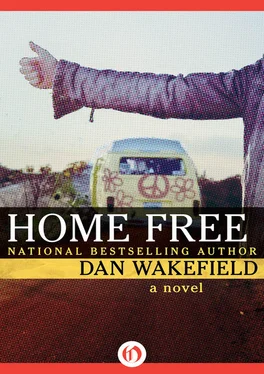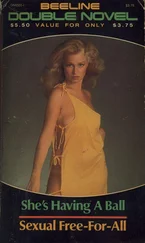Sha-bas .
That was his mantra, specially designed for his personal needs. That’s how you got it on with the meditation, concentrating everything on your mantra.
Gene tried like hell, he did it just like you were supposed to, twice a day.
He wasn’t any good at it. Instead of concentrating on the mantra, after twenty seconds or so he’d think of all kinds of stuff he didn’t want to think about. Lou. His old man. Dying. He pictured primitive tribesmen in awful-looking masks. He came out of the three-minute meditation periods sweating and needing a stiff drink. After about a week or so he gave it up. He wasn’t pissed at the meditation people, he figured this just wasn’t his kind of magic.
He asked Lizzie what her mantra had been, the one suited specially for her own psychic needs.
“Sha-bas,” she said.
“Shit, that was mine. Maybe they recycled the dude.”
“No. I think there’s just two. That and one other one. I think they alternate them, as the people come in. But I guess people like to think their mantra is just made for them special, so they tell em that.”
“Maybe that’s how come I couldn’t get it on,” said Gene. “Maybe they gave me the wrong fuckin mantra. Maybe if they gave me ‘Shazam’ I’d have blown my mind by now and been a regular guru.”
“Maybe,” said Lizzie. She rolled them a joint.
After a great Thanksgiving dinner at the Mulligans’, Gene and Lizzie back at the farm groaning fondly with glazed ham, succotash, sweet potatoes, pumpkin pie, and knowing the whole thing was done with Food Stamps somehow made it even more of a marvel, an extra magical feast. Gene said they’d been to such great parties they ought to have one of their own, not just the Mulligans but others, too, Richie and Marian, some of the regulars from Donnelly’s, people from the other poetry farms around. Gene would construct a giant stew with a beef and apple base, and provide plenty of Wild Irish Rose. You always should go with the wine of the country. Lizzie would buy some good hash and whip up a batch of Fruit-N-Crunch specials, a ready-mix she’d found that hash worked best in of all the ones she’d tried.
Mulligan brought some of his fifties jazz which was good with dinner, sitting on the living room floor with the bowls of stew and then the brownies, but then Gene put “Anticipation” on and they danced with it, everyone, on the slanting farmhouse living room floor, warm, well-fed, friends, flying everyone feeling it, no one denying These are the good old days .
Gene thought, this is what Home should be like. But it isn’t. Or anyway this one. Isn’t mine.
The next morning Lizzie had to get in for a class and Gene was still drinking tomato juice with Worcestershire sauce and popping Excedrins when all of the sudden she was back, her eyes large and shocked.
“You forget something?” Gene asked.
“He called,” she said.
Him.
The He.
Gene was suddenly sober. They sat down on the sway-back living room couch. His first impulse was take her upstairs, at least once more. But he knew it would be no good, she was sitting there still but she was already gone.
She rolled a joint and said, “Don’t say anything.”
He nodded.
They smoked, looking straight ahead.
Gene’s ribs hurt.
When the joint was done she put her arms around him and they hugged. Then she stood up and he went to the door with her.
“Hey, Lizzie,” he said, “it was good.”
She nodded, gravely, then turned away, going to the truck.
He stood on the porch in just his jeans and a half-buttoned shirt, barefoot, not noticing the five-above-zero wind, watching the battered blue pickup start, back out, roar off, to the highway, leaving a cloud.
Aloud, Gene said, “There went the good old days.”
He shivered, hurried inside, and retched.
That night he stayed at Mulligan’s house, and Mulligan said of course he’d drive him to the highway tomorrow if he really was sure …
“This part is over now,” Gene explained. “Not just Lizzie. Living here.”
They got drunk on Wild Irish Rose and Gene told Mulligan he had to keep moving now he knew it was right but he sure hoped sometime he’d find a place to light.
Mulligan cleared his throat and in his poetry voice recited the well-known lines in “Little Gidding” from “Four Quartets” about never stopping our exploring and finally getting back to the beginning and being able to dig the motherin’ place for the first time.
They both were quiet for a while and then Gene said, “Heavy, man. Did you make that up?”
“No,” said Mulligan. “T. S. Eliot made it up.”
“Far out,” said Gene.
Mulligan gave him an old suitcase, the kind with straps around it, a hug, and a ride to Interstate 80. The sky was flat gray, snowflakes stirring. Gene grinned and stuck out his thumb. He thought of the Nilsson traveling song and started singing it, loud, his cold breath coming out in puffs as he sang about the sun coming out through the rain, and his clothes bein’ fine for rain or shine.
Only a few minutes later a pale blue Chevy skidded to a stop on the gravel bank of the road ahead, raising a halo of dust. Gene ran to it, lugging the big strapped suitcase.
He crossed the Rockies with a frail-looking girl behind the wheel of a battered Jag, smoking a flat green hash pipe she kept passing to Gene to light again. On high hairpin curves she’d be fiddling with the pipe and a match, sort of steering with her elbows, saying, “That’s the hang-up with hash. Keeping the damn stuff lit.” Gene did not allow himself to look at the speedometer. When they came down out of the mountains he figured he might make the Coast after all.
At a truck stop in Nevada he picked up a newspaper someone had left on the counter and looked for the date. It was December 2. Hot damn. He would make California for Christmas.
If they had it there.
They did.
There were already big tall Christmas trees lined along Sunset Boulevard. The only difference was, they weren’t green. They were colored a kind of peroxide blonde. A Hollywood Christmas! Gene dug it.
He also dug the place where Barnes was living. The Château Marmont. Gene had never seen a château before, but this dude looked like a regular castle. Even so, at first he couldn’t find it. It wasn’t on the street, it was stuck in this hillside up above Sunset Boulevard. A sure-as-hell castle with cone-topped towers, like right out of Snow White or Robin Hood. There was even a swimming pool beside it invisible from the street, trees all around so people couldn’t peep in. Barnes was livin.
His apartment looked out on the hillside in back, so you wouldn’t have any idea you were right above Sunset Boulevard. You might be in fuckin Spain for all you could tell. The main room had a couch and a bed and a table where Barnes had his typewriter and shit laid out. Off it was a kitchenette with a little refrigerator. Barnes got em a couple cold Mexican beers out of it.
Gene was impressed. But even more than by the place by fuckin Barnes. That was the shocker. Gene had to look at him twice. This was not the sallow old slump of a guy who wore what looked like secondhand threads from another decade. His hair was long but neat and stylish, sort of cupped around his head. His face had a definite trace of a tan. He wore zip boots whose expensive-looking leather was recently shined, a pair of light blue denim pants with all kinds of unexpected pockets and silver buttons, a broad black belt with a big silver buckle, and a white muslin shirt, semicowboy.
“Hey, man,” Gene said, “you writin the movie or playin the lead?”
“The God’s truth is, in this business, it’s hard to know.”
Читать дальше












